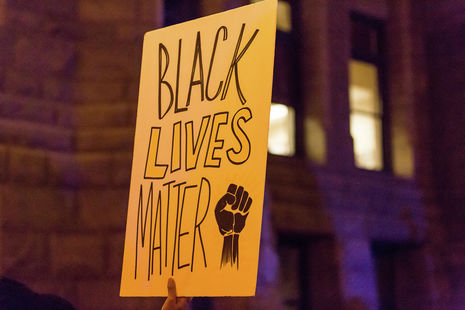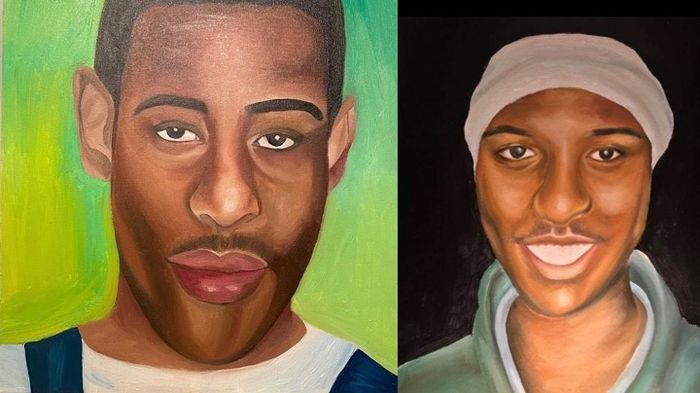Do Black Lives Really Matter to the University of Cambridge?
Ivan Simpson-Kent argues that the University’s statement is not enough for Cambridge’s Black community: now is no time for performative platitudes but for meaningful change and a true commitment to the struggle against anti-blackness.

Content notice: This article contains discussion of anti-black racial violence.
Do Black Lives Really Matter to the University of Cambridge?
This is a question I have been asking myself a lot lately. The senseless murder (yes, murder) of George Floyd on May 25th at the hands of the Minneapolis Police Department has sparked international outrage and protests not only against police brutality but the systemic racism that conceived, gave birth to and continues to nurture such injustices against Black people.
From Minneapolis and Atlanta to London and Berlin, countless individuals have banded together in solidarity to push for substantive change in the myriad ways institutions of power have undervalued and disregarded Black lives. Black Lives Matter protests have reached all fifty US states and have also taken place in the UK this week. Moreover, in the last days we have even seen multi billion dollar/pound companies such as Nike and Netflix, as well as CEOs of tech giants such as Google, SpaceX and Snap, and even Ben & Jerry’s (an ice cream company) have issued statements and made recommendations toward possible avenues for positive change. Of course, their comments might not be sincere and have called out hypocrisy in these statements. Only time will tell whether these are performative displays of ‘woke capitalism’ or whether we are on the brink of meaningful change.
"Besides hosting a few events and slightly increasing the representation of the student body, what have they done for Black people?"
And then, there is the University of Cambridge, one of the most prestigious universities in the world and a place that I, a Black PhD student, have called home for the last two and a half years. And what has been its response to this crisis? An Instagram post stating “they share a sense of outrage and frustration”, followed by a small, superficial and safe statement by Vice-Chancellor, Stephen J Toope, published on the university’s website, tucked away in obscurity right under its message about the ongoing pandemic: "At a time of national and global crisis, Cambridge is rising swiftly and effectively to the challenge". How ironic... The same institution that claims urgency in addressing a “national and global crisis” has failed to make a meaningful statement or take concrete action to combat a worldwide catastrophe that has been staring them in the face and that they have been complicit in for centuries: the exploitation of Black lives and liberties for their own benefit.
But, before I go off on a much-needed rant about the Transatlantic slave trade and the culpability of British universities, let us get back to the university’s poor excuse of a response to the very real crisis happening right now in the United States and indeed Black communities across the world. Why does this response make us so mad? Because it says nothing. What is the university’s stance on the Black Lives Matter movement? Cambridge joined the Race Equality Charter in 2016 and even received its Bronze award in 2019. But for what, exactly? Besides hosting a few events and slightly increasing the representation of the student body (we now have a whopping number of 200 Black students here), what have they done for Black people?
I do believe that the university, including its privileged student body and administration, wants to be (or at least look) progressive regarding race. However, the people making these statements and decisions do not look like us and they are naive to our daily struggles. With every race-related blunder and direct experience of anti-blackness, we are constantly shown that Cambridge is not designed for us. This latest example of politically correct yet empty pandering only deepens our anger, sadness, and disgust at another instance where the university has fumbled a grand opportunity to prove to us that they are for and with us in our struggle against white supremacy. You would think lessons would have been learned from the widely publicised incident between a Black student and a porter earlier this year, but unfortunately, this is not the case.
"This is not the time to mince words."
So what are we asking for? How can Cambridge University start, and I mean start, to make this right? Note, the views on ways forward expressed here do not fully represent the Black community. After speaking with some of my fellow Black friends, here is what we came up with as necessary actions. First, the time is up on being (wilfully) oblivious to racism and its effects, in all its forms. Educate yourselves. It is not the job of Black people to keep explaining to you that saying “All Lives Matter” is problematic and invalidating of our hurt. We do not make this stuff up to get attention. Second, create (together with Black people) and publish (soon!) a tangible, specific and (for Christ’s sake and not the college) concise list of actions the university plans to take in addressing not only its historical role in perpetuating racial discrimination but also its current effects on the Black members of its community. Again, this list should be clear and precise.
Third, commit to work to decolonise the curriculum and encourage other schools in the UK to include the harsh realities of slavery, colonisation and oppression, in addition to the successes of Black people such as the Haitian revolution and Black Wall Street. Fourth, survey the concerns current Black students (and alumni), faculty, staff, and the larger Cambridge community (yes, all Black Lives Matter, even those outside the immediate Cambridge campus) regarding the university’s approaches to dealing with racism. Last, but certainly not least, speak up now and continuously speak up for the plight of Black people around the world, as well as in the UK. Say their names: Christopher Addler, Sheku Bayoh,Mark Duggan, Joy Gardner, Jimmy Mubenga, Belly Mujinga, and Sarah Reed, to name a few. Your silence only further strengthens the foundation for more injustices. On top of these, a list of demands have been posted by the CUSU BME Campaign, of which I am in full support.
Now I know calling you out like this might be taken by many white people, even those who call themselves ‘allies,’ as being harsh and difficult to hear. However, this is not the time to mince words. This is a time for accountability, engagement, and action.
If you have been affected by any of the issues raised in this article, the following information and support is available:
- Mind: A mental health charity providing free online resources.
- Samaritans: A 24-hour mental health helpline.
- The Black, African and Asian Therapy Network: A list of free services available across the UK.
- Ways To Help: A collection of resources, including petitions and bail funds, compiled by Black Lives Matter.
- Learn To Be An Active Bystander: Learn how best to challenge antisocial and discriminatory behaviour on campus.
- CamQuaranchats Podcast: The most recent episode of the CamQuaranchats podcast where students talked about their experiences of institutional racism at Cambridge.
 News / Judge Business School advisor resigns over Epstein and Andrew links18 February 2026
News / Judge Business School advisor resigns over Epstein and Andrew links18 February 2026 News / Gov grants £36m to Cambridge supercomputer17 February 2026
News / Gov grants £36m to Cambridge supercomputer17 February 2026 News / Hundreds of Cambridge academics demand vote on fate of vet course20 February 2026
News / Hundreds of Cambridge academics demand vote on fate of vet course20 February 2026 News / CUCA members attend Reform rally in London20 February 2026
News / CUCA members attend Reform rally in London20 February 2026 News / Union speakers condemn ‘hateful’ Katie Hopkins speech14 February 2026
News / Union speakers condemn ‘hateful’ Katie Hopkins speech14 February 2026










